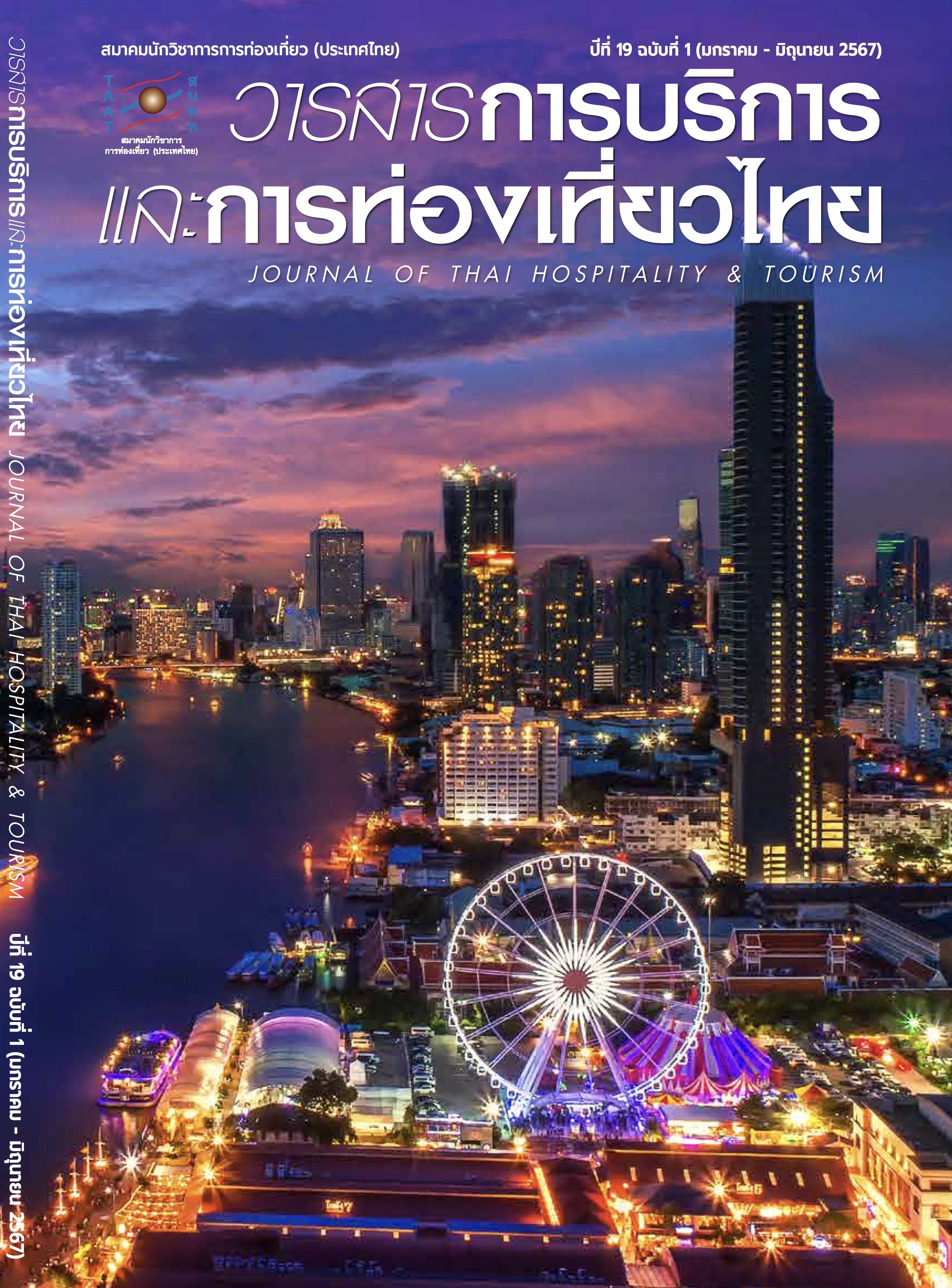การพัฒนาการบริหารนวัตกรรมเพื่อเพิ่มคุณค่าการบริการให้แก่ลูกค้าของธุรกิจโรงแรมในประเทศไทย
Main Article Content
บทคัดย่อ
การวิจัยนี้ มีวัตถุประสงค์เพื่อ 1) ศึกษาประเภทของนวัตกรรมการบริการในธุรกิจโรงแรมที่ตอบสนองการเปลี่ยนแปลงอุปสงค์ของลูกค้า และ 2) ศึกษาแนวคิดและวิเคราะห์กระบวนการพัฒนาและบริหารนวัตกรรมการบริการของธุรกิจโรงแรม โดยใช้วิธีดำเนินการวิจัยเป็นการวิจัยเชิงคุณภาพ กลุ่มตัวอย่างเป็นพนักงานระดับบริหารของโรงแรมระดับ 3 ถึง 5 ดาว ที่ได้รับการรับรองมาตรฐานที่พักเพื่อการท่องเที่ยวจากฐานข้อมูลสมาคมโรงแรมไทย โดยการสัมภาษณ์เชิงลึกพนักงานระดับผู้บริหาร จำนวน 25 คน เลือกกลุ่มตัวอย่างแบบตามสะดวก เครื่องมือที่ใช้ได้แก่แบบสัมภาษณ์ การวิเคราะห์ข้อมูลใช้วิธีการวิเคราะห์ข้อมูลโดยการวิเคราะห์เนื้อหา
ผลการวิจัยพบว่า 1) พนักงานระดับบริหารได้กล่าวถึง นวัตกรรมการบริการที่โรงแรมให้ความสำคัญนำมาใช้และประสบความสำเร็จ ซึ่งสามารถจำแนกประเภทของนวัตกรรมการบริการได้ 5 ประเภท ได้แก่ (1) นวัตเทคโนโลยี นวัตกรรมการบริการที่เกี่ยวข้องกับเทคโนโลยี (2) นวัตผัสสะ นวัตกรรมการบริการแบบเอาใจใส่และมีลูกค้าเป็นศูนย์กลาง (3) นวัตไทย นวัตกรรมการบริการที่มีการผสมผสานคุณลักษณะความเป็นไทย (4) นวัตคณะ นวัตกรรมการบริการที่เกิดจากการผนึกกำลังทำงานร่วมกัน และ (5) นวัตสารัตถ์) นวัตกรรมการบริการที่เกี่ยวข้องกับการสื่อสารธีมเรื่องราวและ 2) ข้อค้นพบในกระบวนการพัฒนาและการบริหารนวัตกรรมการบริการของธุรกิจโรงแรมที่บูรณาการ 2 แนวคิดด้วยกันคือ แนวคิดเรื่องโครงสร้างทีมงานการบริหารนวัตกรรมโดยประยุกต์ใช้ฟอร์คโมเดล และแนวคิดเรื่องการผสานพลังการบริหารทรัพยากรและการพัฒนาบุคลากรของธุรกิจโรงแรมร่วมกันแบบผนึกกำลังการให้บริการภายใต้นโยบายการบริหารนวัตกรรมไปในทิศทางเดียวกัน ทำให้ค้นพบแนวคิดใหม่จากกระบวนการและผลการวิจัย คือ “2S Model” ทฤษฎีการบริหารนวัตกรรมเพื่อเพิ่มคุณค่าการบริการให้แก่ลูกค้าของธุรกิจโรงแรม ซึ่งประกอบด้วย Structure การบริหารองค์กรยุคใหม่แบบมีวิสัยทัศน์นวัตกรรมและ Synergy การผสานพลังให้บริการภายใต้นโยบายเชิงวิสัยทัศน์นวัตกรรมไปในทิศทางเดียวกัน
Article Details

อนุญาตภายใต้เงื่อนไข Creative Commons Attribution-NonCommercial-NoDerivatives 4.0 International License.
เอกสารอ้างอิง
Barone, A. (2021). Investopedia. https://www.investopedia.com/terms/s/synergy.asp
Benecke, G., Schurink, W. & Roodt, G. (2007). Towards a Substantive Theory of Synergy. SA Journal of Human Resource Management, 5(2), 9–19.
Boonrawd, M. (2019). The Effect of Product Innovation and Service Process Innovation on Marketing Performance of 3 to 4 Stars Hotel Businesses in Thailand. NRRU Community Research Journal, 13(3), 225–236.
Career for the Future Academy. (2021). Service Innovation Masterclass 2021. https://www.career4future.com/sim/
Chen, Y., Chen, Z. H., Ho, J. & Lee, C. S. (2009). In-depth Tourism’s Influences on Service Innovation. International Journal of Culture, Tourism and Hospitality Research, 3(4), 326–336.
Croitoru, A. (2012). Schumpeter, J. A., 1934 (2008), the Theory of Economic Development: An Inquiry into Profits, Capital, Credit, Interest and the Business Cycle. Journal of Comparative Research in Anthropology and Sociology, 3(2), 137–148.
Enz, C. A. & Harrison, J. S. (2008). Innovation and Entrepreneurship in the Hospitality Industry. In Brotherton, B. & Wood, R. (eds.), SAGE Handbook of Hospitality Management. Sage.
Gitlow, H. S. (2000). Quality Management Systems: A Practical Guide. CRC Press.
Hassenien, A. & Baum, T. (2002). Hotel Innovation through Property Renovation. International Journal of Hospitality and Tourism Administration, 3(4), 5–24.
Hertog, P. D., Gallouj, F. & Segers, J. (2011). Measuring Innovation in a ‘Low-Tech’ Service Industry: the Case of the Dutch Hospitality Industry. The Service Industries Journal, 31(9), 1429–1449.
Horng, J., Wang, C., Liu, C., Chou, S. & Tsai, C. (2016). The Role of Sustainable Service Innovation in Crafting the Vision of the Hospitality Industry. Sustainable Management in Tourism and Hospitality, 8(3), 223.
Krumm, J. M., Dewulf, G. & De Jonge, H. (1998). Managing Key Resources and Capabilities: Pinpointing the Added Value of Corporate Real Estate Management. Facilities, 16(12/13), 372–379.
Maffei, S., Mager, B. & Sangiorgi, D. (2005). Innovation through Service Design from Research and Theory to a Network of Practice: A Users’ Driven Perspective. In the Joining Forces Conference, Helsinki, Finland.
Maglio, P. & Spohrer, J. (2008). Fundamentals of Service Science. Journal of the Academy of Marketing Science, 36(1), 18–20.
Martín-Rios, C. & Ciobanu, T. (2019). Hospitality Innovation Strategies: An Analysis of Success Factors and Challenges. Tourism Management, 70, 218–229.
Merriam-Webster. (2021). Innovation. https://www.merriam-webster.com/dictionary/innovation
National Statistical Office (NSO). (2021). Tourism and Sports Statistics. http://statbbi.nso.go.th/staticreport/page/sector/th/17.aspx
Nicolau, J. L. & Santa-María, M. J. (2013). The Effect of Innovation on Hotel Market Value. International Journal of Hospitality Management, 32(1), 71–79.
Ottenbacher, M. & Gnoth, J. (2005). How to Develop Successful Hospitality Innovation. Cornell Hotel and Restaurant Administration Quarterly, 46(2), 205–222.
Ottenbacher, M., Shaw, V. & Lockwood, A. (2006). An Investigation of the Factors Affecting Innovation Performance in Chain and Independent Hotels. Journal of Quality Assurance in Hospitality and Tourism, 6(3–4), 113–128.
Peters, M. & Pikkemaat, B. (2012). Innovation in Hospitality and Tourism. Routledge.
Randhawa, P., Kim, M., Voorhees, C. M., Cichy, R. F., Koenigsfeld, J. P. & Perdue, J. (2015). Hospitality Service Innovations in Private Clubs. Cornell Hospitality Quarterly, 57(1), 93–110.
Ratchagit, T. (2021). Build a Team Work with Potential for Effective Teamwork. https://th.hrnote.asia/orgdevelopment/190509-team-work/
Samani, T. (2019). Service Innovation of Hotel Industry in Thailand. Journal of Thai Hospitality and Tourism, 14(1), 103–110.
Schneider, M. (1999). Innovation von Dienstleistungen. Wiesbaden.
Schumpeter, J. A. (1961). The Theory of Economic Development. Harvard University Press.
Souto, J. E. (2015). Business Model Innovation and Business Concept Innovation as the Context of Incremental Innovation and Radical Innovation. Tourism Management, 51, 142–155.
Tang, T., Wang, M. & Tang, Y. (2015). Developing Service Innovation Capability in the Hotel Industry. Service Business, 9(1), 97–113.
Thai Hotel Association. (2019). List of Hotels/Resorts Certified For Tourism Accommodation Standards. Bangkok.
Thomas, R. & Wood, E. (2014). Innovation in Tourism: Re-Conceptualising and Measuring the Absorptive Capacity of the Hotel Sector. Tourism Management, 45, 39–48.
Van Ark, B., Broersma, L. & Den Hertog, P. (2003). On the Soft Side of Innovation: Services Innovation and Its Policy Implications. De Economist, 151(4), 433–452.
Victorino, L., Verma, R., Plaschka, G. & Dev, C. (2005). Service Innovation and Customer Choices in the Hospitality Industry. Managing Service Quality: An International Journal, 15(6), 555–576.
Voss, C. & Zomerdijk, L. (2007). Innovation in Experiential Services – An Empirical View. http://pure.au.dk/portal/files/45289415/Bilag_14_Innovation_in_Experiential_Services_Karl_Kalcher_.pdf
World Travel and Tourism Council (WTTC). (2018). World Travel and Tourism Council. https://www.wttc.org/events/summits/previous-summits/the-global-summit-2018/


